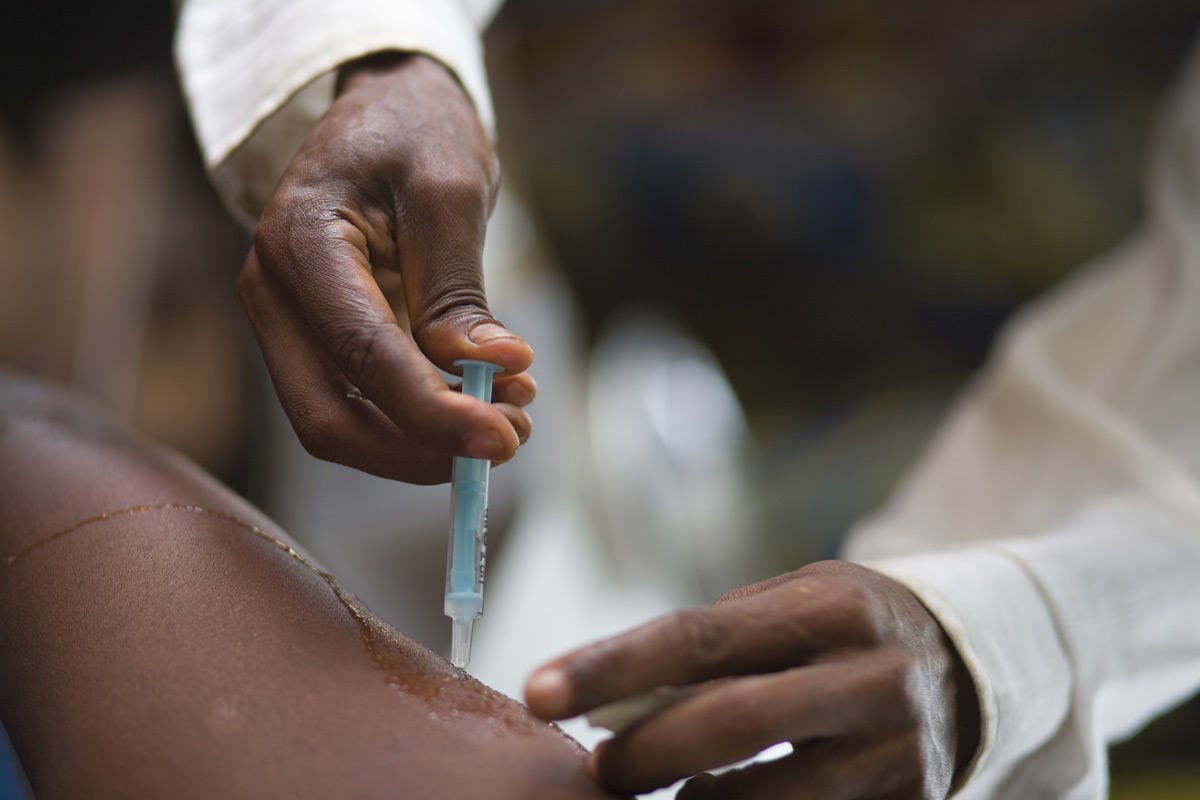African public health experts have hailed the recent approval of the R21 malaria vaccine in Ghana and Nigeria.
The vaccine was developed by the University of Oxford’s Jenner Institute and its global partners.
Some say the move could put the continent on a path to eradicating malaria, although that will take a long time.

“It is the beginning of the journey to ending malaria. We are nowhere near that yet because eradication should take us to a point where we have herd immunity… But this is a step towards that,” said Dr Kwame Sarpong Asiedu, a Ghanaian pharmacist, and Development Fellow in Health with the Ghana Centre for Democracy and Development.
Ghana’s Food and Drugs Authority announced it had approved the R21 malaria vaccine following a series of reviews of clinical and non-clinical data.
He added that access to vaccines will help reduce the cost of healthcare in Africa because using them to prevent malaria will be cheaper than treatment. “That is a key thing this vaccine will do and that is why we are excited about it.”
![Dr. Hubert Amu of the School of Public Health of the University of Health and Allied Sciences in Ghana. [Joseph Opoku Gakpo]](https://allianceforscience.org/wp-content/uploads/2023/04/Dr.-Hubert-Amu.jpeg)
Dr Hubert Amu of the School of Public Health of the University of Health and Allied Sciences in Ghana agrees that the approval is good for Africa.
“Malaria has been a problem for sub-Saharan Africa for decades. So, it is great news that finally a vaccine has been approved for use in Africa to prevent the disease,” he told the Alliance for Science.
The vaccine’s known and potential benefits outweigh its known and potential risks, thereby supporting the manufacturer’s recommended use.
According to the World Health Organization, more than 247 million people are infected with malaria annually, with associated deaths hovering around 619,000.
About 95 percent of all malaria cases worldwide are recorded in Africa, which also accounts for an estimated 96 percent of all deaths with 80 percent of them being children below the age of five.
Work on malaria vaccines began in the 1960s but they are still not widely available.
Ghana’s Food and Drugs Authority (FDA) announced it had approved the R21 malaria vaccine following a series of reviews of non-clinical and clinical data.
Delese Mimi Darko, the authority’s chief executive, said the vaccine has been approved for the immunization of children aged between five and 36 months against malaria caused by Plasmodium Falciparum, which is the deadliest parasite.
The FDA says the evaluation and approval process considered the safety, immunogenicity, and efficacy data generated from five main clinical trials conducted in the United Kingdom, Mali and Burkina Faso, and Tanzania.
“It is hoped that this first crucial step will enable the vaccine to help Ghanaian and African children to effectively combat malaria.”
The FDA says approval of the vaccine was based on a satisfactory evaluation outcome of the quality, safety, and efficacy data submitted to it.
The evaluation of the submission concluded that the benefit of the vaccine significantly outweighs the risk associated with its use.
Days after the approval in Ghana, Nigeria’s National Agency for Food and Drug Administration And Control (NAFDAC) also announced it has given provisional approval for the use of the R21 malaria vaccine.
Prof Mojisola Christianah Adeyeye, the director general of NAFDAC said in a statement that the dossier of the R21 vaccine was subjected to independent review at two levels using standards of the World Health Organization.
NAFDAC’s Vaccine Advisory Committee (NEVAC), which is made up of four highly recognized experts scored the dossier as adequate and fully compliant with the standards.
The in-house NAFDAC’s Vaccine Review Committee also independently scored the vaccine dossier as satisfactory.
Potential benefits outweigh the risks

A joint review by members of both committees agreed that overall, the R21 malaria vaccine dossier complied substantially with the best international standards.
The review also concluded that the data on the vaccine were robust and met the criteria for efficacy, safety, and quality.
It was also adjudged that the vaccine’s known and potential benefits outweigh its known and potential risks, thereby supporting the manufacturer’s recommended use.
The authority says the vaccine will be an additional interventional tool to help the country fight malaria. The authority however recommended an additional Phase 4 clinical trial study in-country given the peculiarity and heterogeneous nature of malaria in Nigeria.
Because of its lower cost, the R21 vaccine is expected to be more popular than Mosquirix, the vaccine that was approved first.
The latest trials show that the vaccine has a 77 percent efficacy rate.
Ghana and Nigeria approved the vaccines even before data on the final stage of trials are published.
But Dr Sarpong Asiedu says that is not a big issue.
“I don’t think the process is strange. Knowing that work on this started in 2000, there is nothing strange about it… The FDA has seen all the data dating back to 2004 and 2005 because they have been involved in the process,” he said.
Expected impact of vaccine
 A statement from Oxford University’s Jenner Institute following the approval said: “It is hoped that this first crucial step will enable the vaccine to help Ghanaian and African children to effectively combat malaria.”
A statement from Oxford University’s Jenner Institute following the approval said: “It is hoped that this first crucial step will enable the vaccine to help Ghanaian and African children to effectively combat malaria.”
The statement added that this breakthrough is a critical step towards reducing half a million malaria-related deaths and improving the health outcomes of millions of people in Africa.

Professor Adrian Hill, the project’s chief investigator said R21 is a low-dose vaccine that can be manufactured at a mass scale and modest cost, enabling hundreds of millions of doses to be supplied to African countries which are suffering a significant malaria burden.
Serum Institute of India which will manufacture the vaccines says it has already established potential manufacturing capacities of more than 200 million doses annually.
Because of its lower cost, the R21 vaccine is expected to be more popular than Mosquirix, the vaccine which was approved first and was developed by GlaxoSmithKline.
Vaccine hesitancy
Dr Sarpong Asiedu doesn’t expect the malaria vaccine to suffer the kind of vaccine hesitancy that the Covid-19 one suffered in Ghana.
“Ghana has had a very strong and extended program for immunization for childhood diseases… Malaria will just piggyback on those programs. In that sense and I don’t think there will be a lot of hesitancy. But we still need a lot of communication,” he said.
Dr Amu said vaccine hesitancy is usually caused by rumors and myths, lack of trust in the healthcare system and personnel, and difficulty in accessing vaccines.
“To reduce hesitancy level, we need to work with community leaders, pastors, imams… We need to have stakeholder engagement. It shouldn’t be a top-bottom approach where everything is dumped on the people. We need to work with the leaders so they can communicate with the people,” he said.
“We need to ensure social education. Education on vaccines should go to the right place.”
